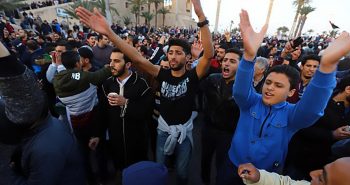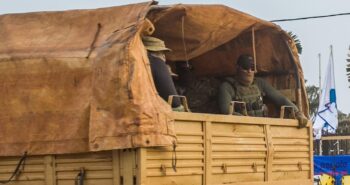By Virginie Collombier
 This paper attempts to make sense of the ‘Political’ and ‘Quietist’ Salafis currents’ relationships with ‘politics’ and state institutions in times of turmoil.
This paper attempts to make sense of the ‘Political’ and ‘Quietist’ Salafis currents’ relationships with ‘politics’ and state institutions in times of turmoil.
.PART (IV)
‘Madkhali’ Salafis: building influence and support at the grassroots level
Unlike the political Salafis, Libya’s quietist Salafis lacked religious figures with appropriate credentials, and therefore could not aim to obtain high-level positions in the state’s new religious institutions.
While Sheikh Rabi’ al-Madkhali seemingly did not constitute a key reference for Libya’s quietist movement when it started to develop in the country in the 1980s, the Saudi cleric gradually came to prominence in Libyan and foreign commentaries after 2011, to the point that Libya’s quietist Salafis became essentially identified as ‘Madkhalis.’
However, descriptions of the Madkhalis tended to be relatively limited. They were described as following Sheikh Rabi’ al-Madkhali, believing in unquestioning loyalty to the sitting (political) ruler and refusing any engagement in politics.
The identification of Libya’s quietist Salafis with al-Madkhali was partly linked to the influence gained by the Saudi sheikh in the Islamic University of Medina after 199027 and the key role subsequently played by the University in exporting the ‘apolitical’ Salafism trend outside the Kingdom.
Rabi’ al-Madkhali did not hold any position in the highest Saudi religious authorities but instead derived his authority from recommendations (‘tazkiya’) from the most highly regarded Saudi ulema’ such as Abdelaziz Bin Baz, Saleh al-Fawzan, Muhammad Ibn al-Uthaymin, Naser al-Din alAlbani and Yemeni Muqbil bin Wadi’i. Building on these clerics’ networks, al-Madkhali attracted many students from abroad, including from Libya.
Madkhali preachers therefore followed the teachings of a range of key Saudi ulema’ who did not necessarily agree on all issues. However, they represented a particular trend in Saudi establishment Islam, refuting those scholars they accused of publicly criticising rulers or deviating from true Islam, particularly those engaged in political Islam.
In the post-2011 context characterised by political instability and growing tensions between supporters and opponents of the Muslim Brotherhood across the Middle East and North Africa, the latter element ended up playing a major role.
The Madkhali trend came to represent the main adversary of political Islam and the Muslim Brotherhood. This was to a large extent the result of a Saudi-backed endeavour to ensure stability against the backdrop of revolutionary change and to counter Qatar’s support for the Muslim Brotherhood across the region.
In the aftermath of the 2011 uprising, however, Libya’s quietist Salafis were much weaker than the political Salafis in terms of religious authority.
The figure of Majdi Haffala, a Tripoli-based preacher also known as Abu Musab, epitomised the movement and its development. In contrast to former LIFG Sami al-Saadi, who enjoyed the status of Islamic scholar (‘alim), Majdi Haffala, despite being one of the foremost preachers in Libya, had not reached this level.
Instead, his authority was much more strongly based on other figures, in particular non-Libyan Islamic scholars with whom he had personal links.
Although he has no official biography like al-Saadi, biographies on Salafi fora highlight his embeddedness in certain networks linked to Saudi Arabia and Yemen as the main source of his authority as a preacher.
Hence, his identity as a teacher seemed to prevail over the qualifications he had obtained and, as such, Majdi Haffala remained reliant on transnational networks in matters of interpretation of high doctrine.
This is in some respects characteristic of the Salafi trend, which to a large extent is based on the informal relationship between the teacher and the student.
Libya’s Madkhali Salafis appear to use the hajj and ‘umra as opportunities to connect with Saudi ulema,’ from whom they request advice on specific issues. Saudi preachers also give sermons to their Libyan followers via telephone.
Overall, Libya’s Madkhali Salafis have remained to a large extent dependent on Saudi Arabia to construct their religious authority. Without the human resources that would have allowed them to compete for positions in the highest echelons of the new religious institutions, Libya’s Madkhali Salafis focused instead on consolidating their influence starting from the grassroots level.
They managed to gradually increase their influence in the Ministry for Endowments and Religious Affairs, first by obtaining positions in the administration.
This allowed them to secure the appointment of preachers at the local level, with a focus on cities of special religious significance such as Zliten, home to one of Libya’s most renowned Islamic universities, Al-Jamaa Al-Asmariya, and al-Zawiya, a symbolic centre for most religious movements in Libya (Sufism, Salafism and political Islam) and the birthplace of Sheikh Al-Taher Al-Zawi, a well-known mujahid during the Italian occupation and an Azharite cleric initially appointed by Qadhafi as the grand Mufti of Libya.
At the political level, the association of the quietist trend with preachers who had exhorted their followers not to join the uprising also made it difficult for them to engage directly with the nascent state institutions and obtain high-level positions in an environment which primarily rewarded revolutionary credentials.
Libya’s Madkhalis, like an important part of Libya’s Salafi sphere, opposed the decision by former LIFG leaders and political Salafis to directly engage in politics by participating in the 2012 parliamentary election.
This was essentially an ideological stance, as they strongly rejected democracy and elections on the grounds that legislation belongs to God and that party politics is fitna, a source of division among the community of believers.
After preaching against involvement in the uprising, Majdi Haffala took strong positions against democracy and involvement in electoral politics. In his ‘Advice to young Salafis,’ he exhorted them not to get involved in political life, parties or elections but instead to focus on studying and teaching people the right path.
However, while the Madkhali Salafists opposed electoral and institutional politics, they did not seem to prioritise autonomy from the new state and its institutions, especially at the local level.
On the contrary, some Salafis who had been involved to some degree in the uprising took advantage of the competition over the nascent security institutions and managed to position themselves in their midst.
This was particularly evident in areas where a prevalence of specific religious trends facilitated their expansion and strengthening.
For instance, in the eastern Tripoli suburb of Souq al-Jouma, a neighbourhood where Salafists had a presence and enjoyed a good reputation before 2011, their role rapidly grew. There, young Salafis began to form neighbourhood vigilante groups focused on imposing order in the local society.
This was both in the sense of security and that of enforcing a particular moral and religious order.
Efforts to combat drugs and alcohol helped them gain some legitimacy at the local level, even though their exclusionary views and intolerance of other religious trends, evidenced through practices such as the destruction of Sufi shrines, were more contentious.
Religious figures also played an important role in linking up different local Madkhali-inspired armed groups across the country. However, this trend largely remained local in character and less visible on the national scene as no well-known emblematic figure emerged to lead and embody the movement.
Souq al-Jouma also directly benefitted from the appointment of neighbourhood native Hashem Bishr, an educated religiously conservative revolutionary who had participated in the liberation of Tripoli,36 to a leadership role in Tripoli’s Supreme Security Committee (SSC).
This institution was set up in 2011 as an attempt to bring the multitude of military councils created during the war under the umbrella of the new authorities.
Through Bishr, Salafis from Souq al-Jouma benefitted from access to the new state institutions and to resources. Among the group from Souq al-Jouma was also Abdulraouf Kara, a former metalworker and Salafi who was from an important family in the neighbourhood.
Known for his piety, he took charge of the local ‘support branches’ of the Tripoli SCC. Like Bishr, he benefitted from being able to work in the social environment of Tripoli’s residential neighbourhoods. When the SSC was dissolved as part of security sector reform efforts, some Salafis from Souq al-Jouma coalesced around one of the new groups set up in its place in 2013, the Special Deterrence Force (SDF, Quwat al-Radaa al-Khassa, commonly known as ‘Radaa’ in Tripoli).
Abdulraouf Kara became the new force’s commander. The SDF’s activities were broadly defined, and it continued to privilege working on imposing order in society.
As he had done with the SSC, Bishr encouraged a bottom-up approach in the SDF, working with municipalities and neighborhood shuyukh, providing the SSC and later the SDF with reputations for being the armed actors best able to work in the populated areas of Tripoli.
This force was officially directly supervised by the Ministry of the Interior. However, the religious character of many of its members frustrated attempts to impose a more regular hierarchy.
At the time, religious figures gained social capital through their involvement in dispute resolution, with some becoming important figures in armed groups. Emblematic of this development, Majdi Haffala’s following greatly increased after 2011, notably among members of local armed groups, including the influential SDF.
His Friday sermons in Tripoli mosques40 progressively attracted hundreds of followers and his convoy moving across the city protected by armed elements regularly drew attention. At the doctrinal level, Libya’s political and Madkhali Salafis fundamentally diverged on the liceity of engaging in political activities.
During the first attempts to build new state institutions between 2012 and 2014, this directly translated into the former attempting to gain influence in the new state through participation in elections and appointments to top institutional positions and, conversely, in the latter focusing on spreading faith and ensuring moral order, mostly at the grassroots level.
Beyond doctrine, the two approaches also had the particularity of being compatible with the opportunities offered by a political transition born out of violent conflict and regime collapse.
In this context, the two currents did not have the same resources to mobilise, which to some extent also conditioned the top-down approach of the political Salafis and the grassroots focus of the Madkhalis.
This was, for instance, visible in Libya’s new religious institutions. While the Madhali current should have seen them as central to their da’wa efforts, they did not constitute a major ground of competition between the two groups during the first years of the transition.
This was probably in part because of a lack of highly qualified religious figures among local Madkhali Salafis. The use of violence also constituted another issue where the relationship between doctrine and practice could potentially come under stress.
A new trend of political Salafism in 2011, embodied in part by some former LIFG leaders, emerged after ‘reformed’ jihadis took up arms against Qadhafi’s regime and contributed to its collapse.
Although they now prioritised political activities, political Salafis potentially remained a major military force in the post-uprising context.
Similarly, the Madkhali current’s efforts to ensure moral order and security at the local level were increasingly reliant on close links between religious figures and armed groups, raising questions about their view of the potential use of violence to spread faith and enforce the moral order they claimed to defend.
***
Virginie Collombier, Middle East Directions Programme European University Institute. She has been a Research Fellow at the European University Institute of Florence, Italy (EUI) since September 2013. Her main research interests are in social and political dynamics in Libya, with a focus on processes of mediation and reconciliation; the political economy of conflicts; security issues.
__________






